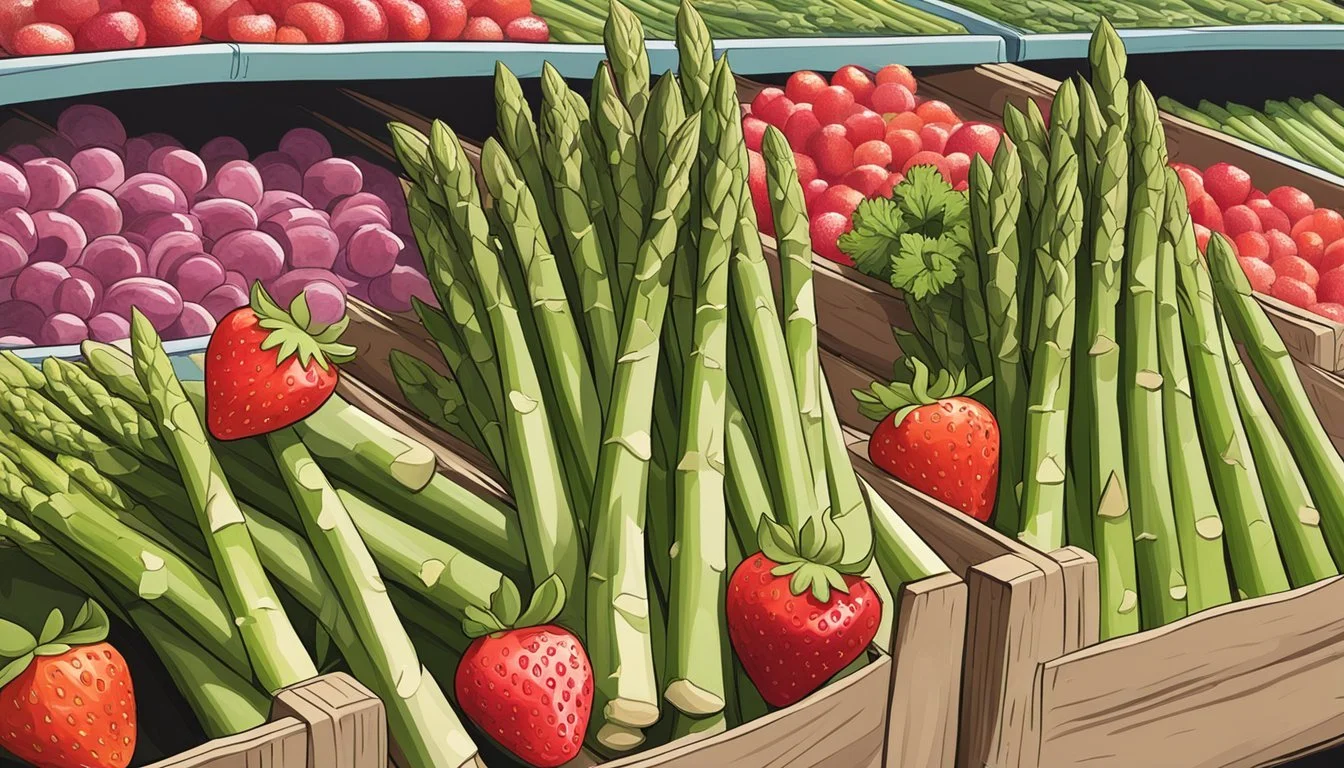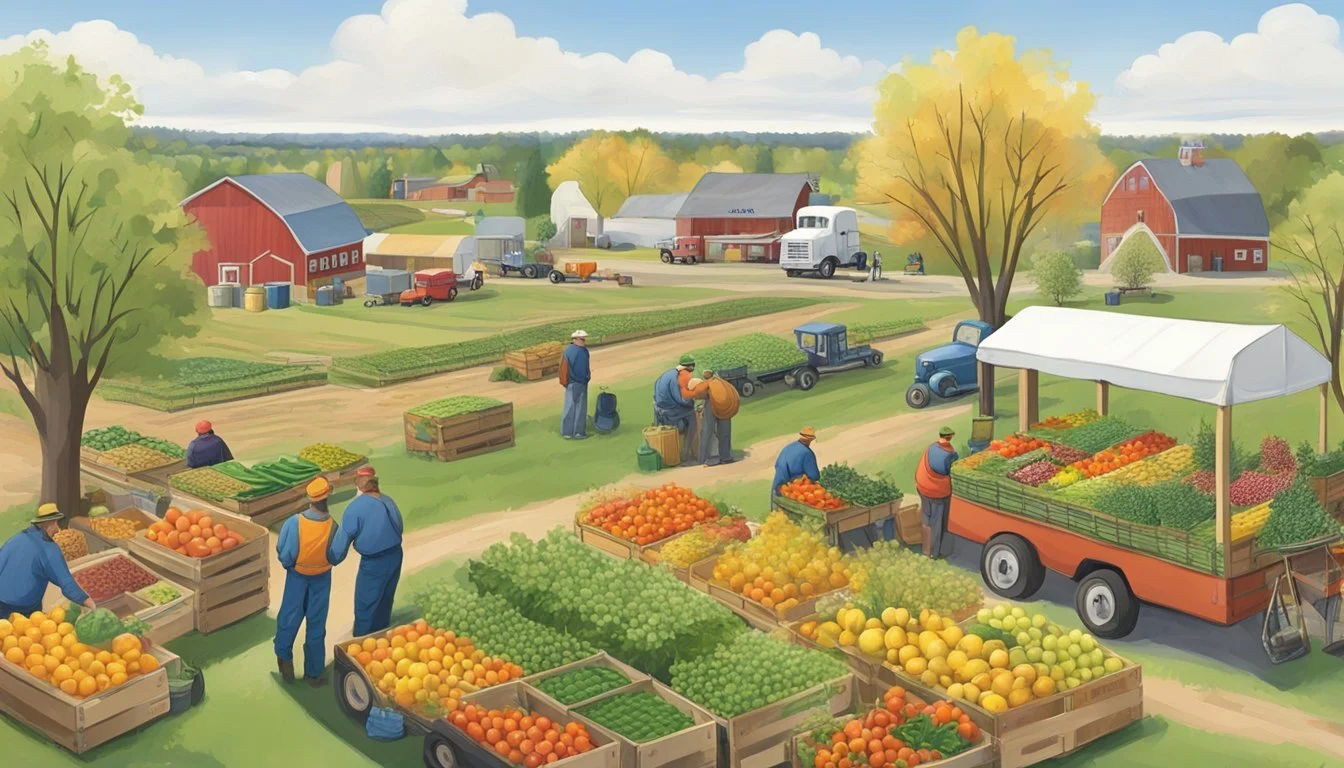Michigan Seasonal Fruit & Vegetables in April
Fresh Picks Guide
This Article is Part of our Michigan Seasonal Fruit & Veg Calendar
Michigan's diverse climate and fertile soil allow for a rich variety of fruits and vegetables to be grown throughout the year, with each season offering its own selection. As April arrives, Michigan residents and visitors are presented with the opportunity to enjoy fresh produce that is just coming into season. Purchasing in-season fruits and vegetables not only supports local farmers and the economy but also provides consumers with produce at the peak of its flavor and nutritional value.
During this month, as the last traces of winter dissipate, the fields and orchards begin to burgeon with new life. In season are the tender stalks of asparagus (how long does asparagus last?), which are among the first to push through the warming soil. They are joined by an array of leafy greens, which thrive in the cooler temperatures that linger from late winter into early spring. Farmers' markets and local produce aisles start to showcase these items, offering fresh options for health-conscious consumers and seasonal eaters alike.
Herbs also start to make their appearance, with their fresh flavors enhancing the culinary palette. Michigan's April harvest allows individuals to explore a variety of tastes and incorporate the freshness of spring into their diets. Eaters are encouraged to engage with local produce sources to find the freshest seasonal offerings available. With the knowledge of what is in season, consumers can make informed choices that promote sustainability, community support, and wholesome eating habits.
Seasonal Availability
Exploring Michigan's bounty in April reveals a variety of fresh produce coming into season, providing an abundance of flavors for local consumers.
Spring Produce Overview
April in Michigan marks the transition into spring, welcoming a fresh selection of produce. Greens, such as spinach and kale, begin to flourish, offering a multitude of health benefits and culinary applications. Asparagus emerges as a hallmark of spring, prized for its versatility and tender stalks.
April's Harvest Calendar
Fruit Availability
Apples: Continues from previous months, varieties may vary.
Rhubarb: Starts in April, tart and suited for pies and jams.
Vegetable Availability
Beets (how long do beets last?): Available, ideal for roasting and salads.
Greens: Includes spinach and kale, perfect for spring salads.
Asparagus: Begins in April, great for steaming or roasting.
Peas: Mid-May to June, but early varieties may start in late April.
Beans: Not typically available until later in the season.
Health and Nutrition
Consuming Michigan's seasonal fruits and vegetables in April ensures that individuals are getting fresh, nutrient-dense foods that are at their peak for flavor and nutritional benefits. These foods typically contain higher levels of vitamins, minerals, and fiber, crucial for maintaining a healthy diet.
Nutritional Benefits of Seasonal Eating
Seasonal produce, harvested and consumed during its peak, provides optimal nutrients. In April, Michigan's asparagus and leafy greens are not only fresh but also packed with vitamins A, C, and K, as well as fiber and folate. Eating these vegetables can contribute significantly to one’s daily nutritional needs, supporting overall health and wellness. Herbs, another produce that starts to become available, are low in calories and rich in phytochemicals and antioxidants.
Diet Diversity in April
April in Michigan offers a diverse palette of fresh produce that can add variety to the diet. Incorporating a range of vegetables like broccoli, cabbage, and various leafy greens meets different nutritional needs by supplying a mix of minerals, such as calcium, potassium, and magnesium. The variety provided by seasonal eating also encourages a wider spectrum of phytonutrients, beneficial plant compounds that support the body’s health.
Local Markets and Farms
In April, Michigan's local markets and farms offer a unique opportunity to access fresh and seasonal produce directly from the source. The importance of supporting these businesses is paramount for the local economy and sustainability of the region's agricultural heritage.
Finding Michigan Farmers Markets
Michigan is home to a variety of farmers markets that operate throughout the year. Consumers looking for fresh produce in April can utilize resources like the Michigan Farmers Market Association to locate these markets. Here are some specifics:
Operating Days/Times: While many markets have varying schedules, some common operating days are Tuesdays and Saturdays.
Available Produce: Depending on the market, shoppers can often find early spring greens and herbs during April.
Resources for Locating Markets:
Websites provide lists and calendars of market schedules.
Partnerships with the Michigan Department of Agriculture & Rural Development keep market information up-to-date.
Supporting Local Farms
Local farms in Michigan are essential businesses that contribute to food availability and diversity. April is a time when they begin to sell early crops and prepare for the primary growing season.
Direct Purchase: Many farms operate storefronts or stands where consumers can buy produce directly.
Community-Supported Agriculture (CSA): Some farms offer CSA programs, allowing individuals to subscribe and receive a portion of the harvest regularly.
Impact on Economy: Supporting local farms bolsters the regional economy and maintains farming traditions.
Food Preparation Tips
April's seasonal produce in Michigan offers a bounty of flavor and nutrition. Proper storage and cooking techniques can maximize freshness and taste.
Storing Fresh Produce
Asparagus should be stored in the refrigerator with the cut ends submerged in water, or wrapped with a moist paper towel and placed in a plastic bag. This helps maintain its crispness. Leafy greens like spinach and lettuce stay fresh when loosely packed in a plastic bag with air blown into the bag before sealing, which provides a cushion against bruising and maintains a mini-greenhouse atmosphere.
Herbs, depending on variety, often last longer when stored in the refrigerator, either loosely wrapped in a damp paper towel or stem-down in a container of water covered with a plastic bag. For example, parsley and cilantro can be treated like a bouquet of flowers, while basil is best kept at room temperature out of direct sunlight.
Cooking Seasonal Vegetables
When it comes to cooking, each ingredient can shine with the right method. Asparagus is versatile—it can be steamed, roasted, grilled, or stir-fried. One simple yet delicious approach is roasting asparagus spears with a bit of olive oil, salt, and pepper, which intensifies its natural flavor.
Leafy greens can transform salads and sandwiches or be cooked down into comforting soups and stews. An easy recipe might involve sautéing greens with garlic in olive oil for a simple, nutritious side dish.
Maximizing the life and flavor of Michigan’s April produce allows one to explore a variety of recipes and enjoy the full range of what the season has to offer.
Gardening and Crop Cultivation
April in Michigan marks a significant transition for gardeners and farmers anticipating the start of a fruitful growing season. The state's weather during this time influences the type of crops suitable for planting, with the focus shifting towards hardy vegetables that can withstand cooler temperatures.
Starting a Vegetable Garden in Michigan
When initiating a vegetable garden in April, Michigan gardeners must consider the state's climate. Specifically, the frost dates play a crucial role in determining the planting schedule. Vegetables such as peas, lettuce, and spinach are ideal to start with because they are cold-hardy and can endure the tail end of Michigan's frosty spring. It is also the time to begin indoors with seeds for summer vegetables like tomatoes and peppers, which will be transplanted outdoors once the threat of frost has passed.
Cold-Hardy Vegetables to Plant in April:
Peas
Lettuce
Spinach
Kale
Broccoli
Key Crops for Michigan Gardeners
Among the key crops for April, root vegetables also take a prominent spot. Carrots, beets, and radishes can be sown directly into the garden as they are resistant to cool soil and air temps. For a successful harvest, a gardener must ensure that the farm or garden soil is well-drained and fertile. Crop rotation is advised to prevent diseases and ensure the soil remains nutrient-rich.
Root Vegetables to Plant in April:
Carrots
Beets
Radishes
The weather during this month can still be unpredictable, with occasional cold snaps, so gardeners should monitor local forecasts closely and take measures to protect their crops if necessary. As the weather warms over the course of the month, more varieties can be planted, and the preparations for the later harvest season commence.
Seasonal Activities and Events
April in Michigan ushers in a plethora of activities centered around local produce and farm experiences. Community involvement peaks as visitors and families engage in food-oriented festivities and educational farm visits, celebrating the bounty of the region.
April Food Festivals
Michigan's local food festivals in April are a vibrant showcase of the season's fresh harvest. They provide an exploratory journey for food enthusiasts keen on tasting and celebrating the spring flavors. Community gatherings such as maple syrup (how long does maple syrup last?) festivals not only offer a delight for the palate but also boost local farmer morale by highlighting their produce. These festivals often include:
Tasting events featuring seasonal fruits and vegetables
Cooking demonstrations and competitions
Local artisans and farmers markets
Educational Farm Tours
Farms across Michigan open their gates in April for educational tours that provide a deep dive into agricultural practices and the significance of seasonal harvesting. These tours aim to:
Educate visitors about sustainable farming techniques
Allow families to experience farm life and the journey from farm to table
Encourage community engagement and support for local farms
On these tours, children and adults alike can learn about crop cycles and the importance of seasonality in farming, while often getting the opportunity to participate in hands-on activities such as planting or harvesting.
Environmental Impact
In Michigan, the environmental benefits of consuming seasonal fruits and vegetables are significant. April's local produce not only supports sustainable food practices but also bolsters the local food movement.
Sustainable Food Practices
Sustainable agriculture in Michigan involves growing food in a way that conserves natural resources and reduces carbon footprints. In April, the state's farmers prioritize crops that thrive in the seasonal climate, reducing the need for energy-intensive greenhouses and artificial growing conditions. Life cycle assessments (LCAs) indicate that locally sourced, in-season produce like asparagus and cucumbers necessitates fewer transport miles, substantially lowering greenhouse gas emissions compared to out-of-season or imported foods.
The Local Food Movement
The local food movement in Michigan underscores the importance of sourcing food from nearby farms, which in turn benefits the environment. Fresh fruits and vegetables consumed in April, such as those found at local farmers' markets, require less transportation, resulting in reduced fuel consumption and air pollution. Moreover, the movement fosters a closer connection between consumers and their food, promoting awareness and demand for environmentally considerate farming practices.
Economic Aspects
Michigan's agricultural sector plays a pivotal role in bolstering the state's economy, especially through the cultivation and sale of fruits and vegetables in markets. By purchasing local produce, consumers not only obtain fresh products but also contribute to the economic stability of their communities.
The Role of Agriculture in Michigan's Economy
Agriculture is one of the leading industries in Michigan, contributing significantly to the state's economic output. As of April, several crops are typically harvested, including greens and herbs, which are essential parts of the agricultural offerings during this month. The presence of various fruits and vegetables like asparagus and rhubarb begin to emerge in the markets as well. Farmers' direct sales to local markets enhance the financial wellbeing of the rural areas and maintain the cash flow within the state.
Primary Contributions to Michigan's Economy from Agriculture:
Employment: Agriculture provides numerous jobs, from farm workers to transportation and market sales roles.
Revenue: The sale of crops and agricultural products generates substantial income for the state.
Economic Benefits of Buying Local
Buying local produce from Michigan's markets yields meaningful economic advantages. Firstly, it supports the state's farmers directly, allowing them to reinvest in their businesses and sustain their operations. Secondly, money spent on local produce stays within the local economy, creating a multiplier effect that benefits various sectors including retail, services, and agribusiness.
Advantages of Buying Local Produce:
Community Support: Money spent at local farms and markets supports Michigan families and preserves local farming culture.
Quality and Nutrition: Consumers enjoy fresher, more nutritious produce, as locally grown fruits and vegetables are often harvested at their peak ripeness.
By providing economic benefits to both the farmers and the wider state economy, buying local in Michigan has a positive ripple effect that extends far beyond the immediate transaction.
Conclusion
April in Michigan marks the onset of the spring harvest season. They witness the arrival of an assortment of leafy greens that become available at farmers' markets and grocery stores across the state. Consumers looking to incorporate Michigan produce into their diets can find an abundance in variety, with options ranging from nutrient-dense spinach to crisp romaine lettuce.
Seasonal Selections for April:
Spinach
Kale
Romaine Lettuce
Arugula
These leafy greens, tended to by local farmers, are not only the epitome of freshness but also bolster the concept of farm-to-table eating. Their availability underscores the diversity of Michigan's agricultural landscape even in the earliest parts of the growing season.
In summary, April's produce offerings highlight the initial bounty to be expected from Michigan's rich agricultural tapestry. While the selection may continue to grow and become more varied as the season progresses, the leafy greens available provide a promising indication of the quality and vitality inherent in locally-sourced produce.
Those who prioritize health and sustainability can begin their seasonal eating journey with these early Michigan crops. As one chooses to support local agriculture, they also commit to promoting a healthier lifestyle and a robust local economy.









